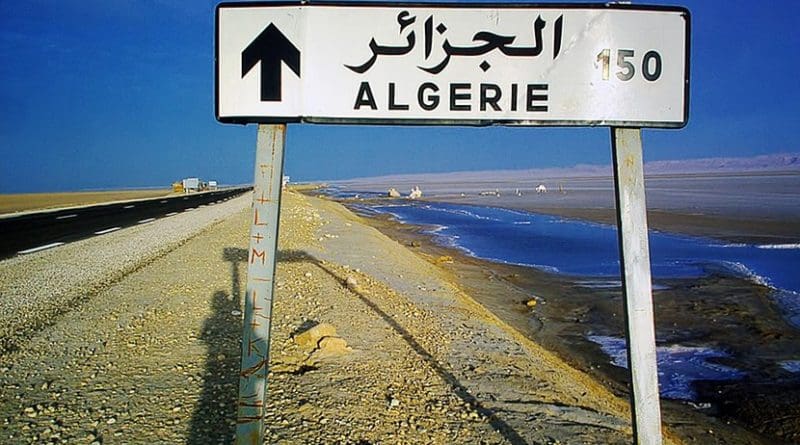Little Reason For Optimism As Algeria Awaits Dew Dawn – OpEd
By Arab News
By Talmiz Ahmad*
One day after last week’s presidential election in Algeria, political veteran and former Prime Minister Abdelmadjid Tebboune was declared the winner with 58 percent of the vote in a field of five candidates. But neither the election nor the result have brought stability to a country that has been experiencing public demonstrations involving thousands of people since February.
These protests had called for a boycott of the election, which was viewed as a “mockery” and the outcome of a “rigged system for corrupt officials.” Popular slogans included, “No elections of shame,” and “No vote. We want freedom.”
The election commission has claimed that 40 percent of the electorate of 24 million voted, but this has been derided by the opposition movement, Hirak, and agitations for reform have continued.
The protests began in February, when then-President Abdelaziz Bouteflika, in office for 20 years, announced his intention to seek a fifth mandate. Ailing and effectively non-functional since 2013, Bouteflika was generally seen as a front for Algeria’s corrupt elite, made up of politicians and businessmen that, headed by the military, had kept itself in power since independence in 1962.
The prospect of this system being continued under a decrepit leader brought hundreds of thousands of Algerians on to the streets every Friday. They demanded the end of the military-led corrupt order and its replacement with a system based on a new constitution that would ensure transparency and accountability in governmental functioning.
In April, under popular pressure, Bouteflika agreed to step down. This was followed by the arrest of senior officials, including his brother, two former prime ministers, the intelligence chief and several prominent businessmen. Presidential elections, scheduled for April and then July, were postponed, while in September some of Bouteflika’s associates were given long prison sentences.
But the demonstrators were not appeased and insisted on the removal of the interim president and prime minister, both longstanding associates of the Bouteflika regime. At this point, the military chief, Lt. Gen. Ahmed Gaid Salah, adopted a hard-line posture and got the interim president to announce presidential elections on Dec. 12. Salah hoped that the election would end the agitations by bringing in a new leader who would provide legitimacy to the political order. He described opponents of the vote as “a criminal gang.”
Though the agitations were peaceful, a policy of repression was inaugurated that included the arrest of several prominent supporters of the demonstrations. It is believed that at least 150 agitators are in detention, incarcerated by a pliant judiciary.
The parlous state of the economy and perceptions of rampant corruption are the principal drivers of popular anger. The overall unemployment rate is about 11 percent, while for the youth, who account for two-thirds of the population, it stands at about 29 percent. In a country that derives 95 percent of its export earnings from the sale of oil and gas, the fall in hydrocarbon prices has aggravated the downturn: Foreign exchange reserves have fallen 70 percent — from nearly $200 billion in 2014 to $72 billion in 2019 — thus jeopardizing imports of essential items.
The military’s role in national affairs is enshrined in the constitution, making it the guardian of national independence, sovereignty, unity and territorial integrity. It uses these provisions to ensure that it remains fully funded and its various institutions remain outside public purview. The principal concern of the armed forces is to ensure their continued primacy in the ruling order.
Hence, the army chief sought to achieve a credible presidential election. He used a media campaign that suggested widespread backing for the elections, put up five candidates — all from within the existing political establishment — and even arranged a tightly controlled televised “debate” among them. On the eve of the election, long prison sentences were awarded to two former prime ministers and several businessmen accused of corruption.
None of these efforts seem to have worked. The corruption trials have been dismissed as a “charade” and a “demagogic and populist operation.” The election was described as a “circus” and the candidates as “clowns,” with the popular demand being the wholesale dismantling of the present order.
With the armed forces pursuing a tough posture to tire out the agitators, the outlook for Algeria is uncertain. Some reports have indicated that Hirak could adopt new, more aggressive tactics to pressurize the government, including nationwide strikes and a popular civil disobedience movement. There are also suggestions that the movement could identify leaders who would negotiate reform with the authorities and possibly even compete with existing politicians for positions in government and the assembly.
President Tebboune has projected a conciliatory approach: His associates have highlighted his dislike for businessmen who benefited from the old system, his backing for an independent judiciary and freedom of speech and the media, and his interest in releasing detained agitators. He has also invited the protest movement for a dialogue on a new constitution “to build a new Algeria.”
The next few weeks will reveal whether Algeria will see a new dawn. However, given its past record, there is little reason for optimism.
• Talmiz Ahmad is an author and former Indian ambassador to Saudi Arabia, Oman and the UAE. He holds the Ram Sathe Chair for International Studies, Symbiosis International University, Pune, India.

